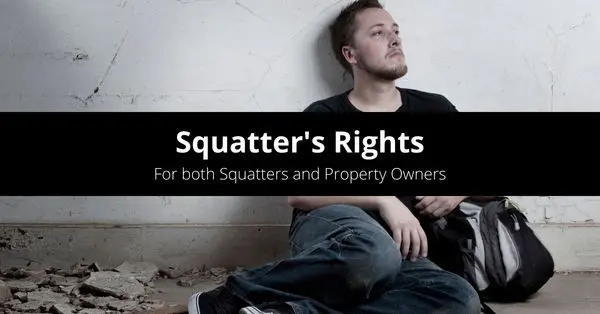Squatter’s rights are protections given to people who occupy a property without permission. These people are called squatters, and both the squatters and the property owners have rights. These protections vary from state to state, but no matter where the squatting occurs, there are a few protections that exist across the USA.
Squatters have the rights in the USA to:
- Be treated like regular tenants
- A safe and habitable living space
- Fair and legal eviction
- Possibly gain ownership of a property through ‘adverse possession’
If you’re worried about a squatter using adverse possession, don’t be. It is very hard to accomplish and you as a property owner have options. For example you can find a real estate investor like us and sell your house for cash. This way you rid yourself of the headaches and can move on quick and easy. We’re experts in handling squatter situations. And if you’re a squatter, you also have protections and ways to protect yourself, especially if you did not know you were actually squatting.
Squatters aren’t just people that randomly move into your property, they can also be:
- Tenants staying past the expiration of their lease
- Homeless people living on the property
- Someone tricked into renting a house by a landlord that doesn’t actually own the property
- A neighbor accidentally building a fence on your property
- You in your own home, if the wrong house is on a deed!
- This is normally detecting by a title company and you may be protected with title insurance.
And that leads us to one of the biggest questions, “Are trespassers considered squatters and vice versa?” Good news, no, trespassers are not squatters, but squatters can be trespassers.
A trespasser is a single person or a group of people that enter a property for a short period of time to explore, steal, or vandalize it, while squatters enter property to live there or otherwise use the property as a long term residence. And when the squatter settles in, they’re given rights whether the property owner likes it or not.
Why Squatters Have Rights
Squatters have rights to protect them from being unfairly removed from “their” homes. Again, not all squatters entered maliciously and the laws are meant to give each party time to resolve complications fairly. The first and most important of the squatter’s rights is the protection from unfair eviction with dishonest landlords.
A landlord cannot lie and say you as a tenant never signed a contract with them, claim you’re a squatter, and immediately kick you out. This squatter’s right is designed to protect everyday people from landlords that want to simply rent the property for higher values, move family in without hassle, or sell the property without giving tenants time to move.
The second right you have as a squatter is home protection from situations where the real estate deed accidentally lists a different property. An example is the case of Howard vs. Kunto. Instead of kicking the residents out, the squatters were granted ownership of the property they’d acted as the owners of for years.
Besides preventing unfair removal, some lawyers and philosophers also believe squatters should have rights for practical reasons. Vacant homes can attract infestations and crime which hurts property values and can hurt others within the community. If there is a squatter and they make the home appear lived in while maintaining it inside and out, they are protecting the community which benefits everyone.
Now that you know why squatters have rights, let’s take a look at what adverse possession is and how a squatter can take ownership of the property, and then how a property owner can protect their land and home.
How Squatters Can Take a House Through Adverse Posession
Adverse possession is part of squatter’s rights which allows squatters to gain ownership of property by living there. But it’s a difficult process and if you take this route you’re in for a fight.
Fun fact: Adverse possession dates back to medieval England. In the time of Vikings and warlords, if you could hold on to a bit of land you had the right to call it your own!
Every state has different laws for adverse possession to come into effect. But according to Cornell Law you need to meet these five criteria for adverse possession:
- You must occupy the property without interruption, referred to as ‘Continuous use.’ The length of continuous use varies state to state, from 3-30 years.
- You need hostile possession of the property. Hostile doesn’t refer to those Vikings mentioned above, it just means you can’t have permission to use the property, like a leasing agreement.
- It should be obvious that you’re living in the property, which is called ‘Open and notorious possession.’ You can’t hide there and sweep away all evidence come morning.
- Adverse possession requires ‘Actual possession.’ This just means you are using the property. In some states this extends to maintaining it through mowing the lawn, repairing broken windows, and even paying taxes!
- You must prevent others from trespassing on your property like you owned it yourself. This is referred to as ‘Exclusive possession.’
Depending on the state the property is in, you may need to jump through more hoops to meet the criteria for adverse possession.
Here are three examples from three different states:
- Florida: You must occupy a house for seven years, pay all taxes and mortgages on the home, and actively work to improve it
- California: You must occupy the property for five years, and pay any taxes on the property
- Virginia: You must occupy the property for 15 years, which is quite long. But it allows ‘tacking-on.’ If you squat in the property for seven years and then ‘give’ the place to Jane, who squats for another eight years, the court would consider that 15 continuous years.
If you’re a homeowner, you now know how a squatter is going to try and take your property, and what their rights are. So what can you do if you don’t want to sell a squatter house? Simple, prevent squatters from moving in before the problem starts.
How To Prevent Squatters
The best way to prevent squatters from claiming your property is to keep them from occupying it in the first place. Seems obvious right? But what happens if you inherited a home that you ignored, you inherited a house where the previous owner allowed someone to live in the basement and you don’t want to deal with tenants, or you have a vacation property you leave dormant most of the year because it was an investment and you’re taking the loss for tax purposes? There are a lot of situations like these, and more common ones that can occur.
Take these steps to stop squatters before they start:
- Keep your property continuously occupied.
- Check the property regularly to ensure sure no one is occupying it. If you’re not in the area, have a friend inspect it or hire someone to do a weekly sweep.
- Lock all doors and windows to keep squatters and burglars from entering your property. If you’ve had trouble with squatters in the past, have a locksmith change the locks. Also be sure that there are no holes in the roof or walls.
- Post ‘No Trespassing’ signs along the property lines and entrance. These can help avoid misunderstandings such as the neighbor building a fence on your land.
- Signs can be especially useful if you live next to public land, as hikers might otherwise believe your land is public property, or abandoned if it is in disrepair or condemned.
Even after taking these precautions, squatters may still accidentally occupy your property. And you as a property owner have options to get rid of squatters or make money.
The first options is to create a rental agreement for the potential squatter. A rental agreement gets you cash, gives the squatter a place to live, and makes sure the property stays in your possession.
Next you can create a property treaty which allows the squatter to use your property while preventing them from taking adverse possession. With the help of a licensed lawyer, draft a legally binding treaty which solves problems like a neighbor who accidently built a fence on your property. By doing this the neighbor must maintain the fence while ensuring the land still belongs to you.
The most important thing to do is to act quick. If you hesitate then you could find yourself ending up in an expensive court battle for your property.
Squatter’s rights are there to protect both the squatter and the property owner. If you’re the legit owner of the property, squatter’s rights may not seem fair. But also think about what would happen if you had a deed transferred and discovered you’re a squatter yourself. This is why squatter’s rights exists and who they are meant to protect. And if you’re looking to sell your house with a squatter, call us at to see how we can assist.


